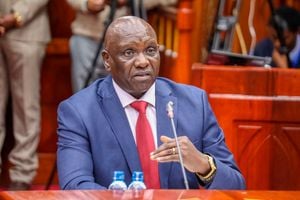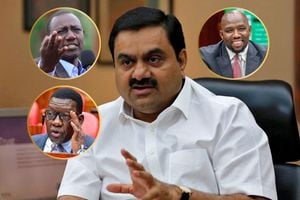Mwithaga: Firebrand who served, endured Kenyatta and Moi
What you need to know:
- Mwithaga will be remembered, together with Jean Marie Seroney, as the two MPs who sought a constitutional amendment to have MPs given more freedom of speech in the House.
- Mwithaga was the last of the 1970s firebrands who served, suffered and survived both the Kenyatta and Moi administrations.
- He will be remembered as a man who was eclipsed from politics for seeking justice and the rule of law.
The time: December 1974. The place: Stag’s Head Hotel, Nakuru. The actors: Mark Mwithaga, Nakuru Town MP, plays darts over a drink with Josiah Mwangi Kariuki, the populist Nyandarua North MP.
Both men had defied odds to win their seats in a spectacular manner in the general election two months earlier.
JM, as he was popularly known, had been barred from campaigning and was only allowed to pin his posters in select places. Mwithaga has trouble with the political system for his loud mouth.
Their camaraderie is broken by the entry of Peter Muigai, Jomo Kenyatta’s eldest son, and Nakuru Mayor Mburu Gichua.
The two pointed at JM and Mr Muigai said: “You have brought trouble here from Nyandarua.
Be warned; this is Nakuru and we can finish you at any time!”
Mwithaga, who died on Tuesday at 79, was shocked by the accusation and the threat.
As he would recount later, “Muigai and Gichua never even bothered to say ‘hallo’ to us. They just lectured JM and left. We were very, very shocked.”
Three months later, JM was assassinated and his body dumped in Ngong Forest.
As fate would have it, Mwithaga became the vice-chairman of the parliamentary select committee investigating JM’s disappearance and subsequent death.
“The major problem we faced was a police cover-up by some officers,” said Mwithaga after the report was tabled. “It was not easy to get co-operation from the police, although we received a lot of it from some Special Branch Department officers.”
Mwithaga said the committee learnt that some of the witnesses “were taken to Karura Forest, where they were warned that they would be shot dead if they dared divulge information” on JM’s murder.
He told Parliament that Evans Ngugi, the man who opposed JM in the 1974 elections, refused to appear before the committee despite numerous appeals.
“The police told us they could not find him,” Mwithaga lamented then, “yet we often hear Mr Ngugi was among those who recently addressed meetings which have been going on.”
His selection into the JM probe team gave him a chance to take on his friend’s tormentors.
The team was chaired by Mr Elijah Mwangale but it was Mwithaga who became its face. For years, he was troubled that they were forced to delete the name of Mbiyu Koinange, Kenyatta’s Minister of State, from the list of those who were to be investigated.
Mwithaga will be remembered, together with Jean Marie Seroney, as the two MPs who sought a constitutional amendment to have MPs given more freedom of speech in the House.
This became part of the privilege given to MPs — although it would be tested when Seroney and then Butere MP Martin Shikuku were detained without trial for saying “Kanu is dead” in Parliament.
Mwithaga’s election was cut short by a petition but he went on to win the by-election from prison — becoming the first Kenyan to win a seat while serving time. He had been charged with assaulting his ex-wife some 20 months earlier, damaging her pullover and nightdress worth Sh225.
Peter Kibisu, an assistant minister who had voted against the government on the JM report, was jailed for 15 months after an old assault charge was revived.
Political pundits read more into the Mwithaga case.
In the 1974 polls, the powerful political grouping of Dickson Kihika Kimani had come up with a line-up for Nakuru District.
They had convinced Nakuru North MP Babu Wood not to vie and underestimated the young Koigi wa Wamwere, who was to face Kihika Kimani.
Koigi and Mwithaga would later pay for being the two anti-Kihika MPs in the district: Koigi was detained on August 5, 1975 and Mwithaga jailed for two years.
Upon the death of President Kenyatta, President Daniel arap Moi got a chance to reorganise Nakuru politics in the 1979 elections.
He brought in Kariuki Chotara and all the other politicians opposed to the Kihika Kimani camp.
That was how Mwithaga won his seat in 1979.
He, however, later fell out with President Moi and was forced to abandon the leadership of the giant Nakuru Transport Co-operative (Natco), which owned the popular town service buses.
The order came from President Moi in 1982 when he accused Mwithaga of “meddling in politics”.
The diminutive MP also lost his Nakuru seat to Amos Kimemia in the 1983 Njonjo-scare elections.
Mwithaga’s career would face numerous tests. With the introduction of multiparty politics, he joined the Democratic Party and became its Nakuru Branch chairman.
After all, Mr Mwai Kibaki, who the then DP national chairman, was the best man when, in 1970, Mwithaga wed “Miss Bethany” — as his wife Fridah Wanja was known.
During the first multiparty election, he lost to Ford-Asili’s Lwali Oyondi — a younger brother of Martin Shikuku, then the party’s secretary-general.
Mwithaga was the last of the 1970s firebrands who served, suffered and survived both the Kenyatta and Moi administrations.
He will be remembered as a man who was eclipsed from politics for seeking justice and the rule of law — one of the reasons why he decided to study law despite his advanced age.





